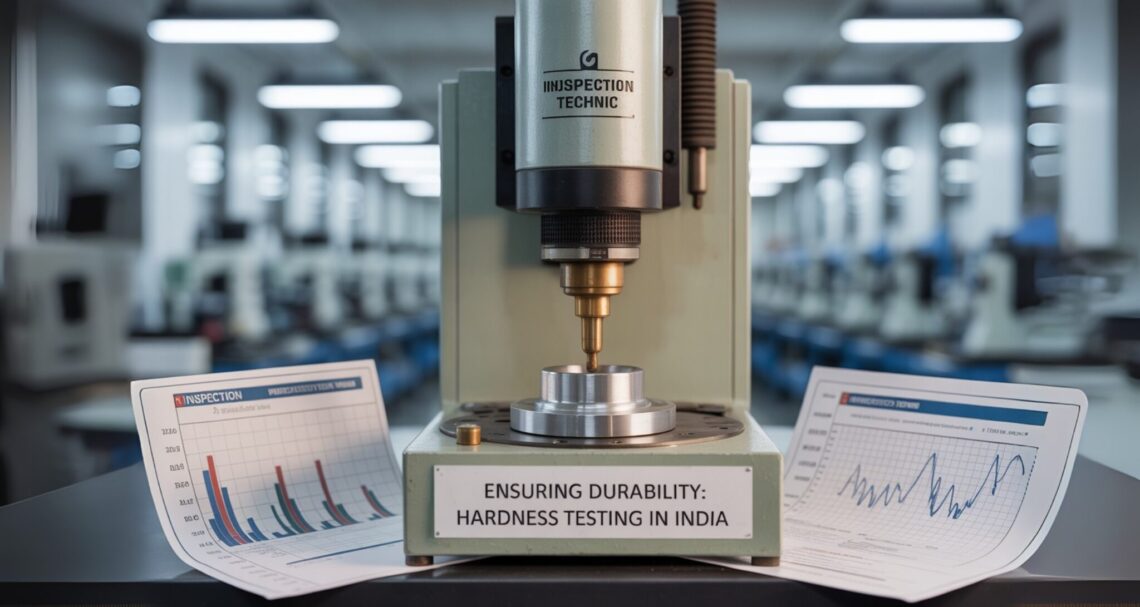
Durability: Hardness Testing in India
At INSPECTION TECHNIC, we deliver reliable and accurate hardness testing services to assess the strength and durability of industrial materials. This essential non-destructive testing (NDT) method helps industries such as oil & gas, construction, manufacturing, and automotive determine how well materials can resist pressure, wear, and deformation—ensuring safety and high performance in demanding conditions.
What is Hardness Testing?
Hardness testing is a method used to measure a material’s resistance to indentation, scratching, or deformation without causing damage. Depending on the material and inspection needs, we apply the most suitable testing technique:
Rockwell Hardness Test – Measures how deep an indenter penetrates under load. Fast and commonly used for industrial parts.
Brinell Hardness Test – Uses a hardened steel ball pressed into the material. Best for large, rough samples and uneven surfaces.
Vickers Hardness Test – Involves a diamond-shaped indenter and a microscope for precise measurements. Ideal for thin materials or small samples.
How Does Hardness Testing Work?
Surface Preparation – Clean and polish the test surface to remove any contamination.
Indenter Application – Apply the chosen indenter under a specific load.
Measurement – Measure the depth or width of the indentation using calibrated equipment.
Calculation – Use a standard formula to calculate the material’s hardness.
Analysis – Compare the result against industry standards to check if the material meets required performance levels.
Applications in Indian Industries
Oil and Gas: We inspect pipelines, tanks, and pressure vessels to prevent internal failures and maintain safety at every stage
Construction: X-ray testing is used to verify the quality of welds and components in bridges, buildings, and infrastructure—keeping projects solid and safe.
Manufacturing: High-pressure machinery and components undergo radiography checks to confirm quality before use or installation.
- Automotive: Critical vehicle parts—like engine blocks and axles—are tested to ensure safety and performance.
Benefits of Hardness Testing
✅ Accurate Material Evaluation – Helps in choosing the right material for your project.
✅ Non-Destructive Process – The component remains intact and usable after testing.
✅ Fast and Efficient – Delivers quick results for immediate decisions.
✅ Works with Various Materials – Suitable for metals, ceramics, and plastics.
✅ Supports Quality Control – Confirms components meet required strength and safety standards.
INSPECTION TECHNIC: Your Partner in Hardness Testing
With certified inspectors, advanced equipment, and years of field experience, INSPECTION TECHNIC India brings top-level hardness testing to your doorstep. Whether you run a plant, a refinery, a factory, or a fleet—our experts help you make strong decisions backed by strong data.
Frequently Asked Questions
- Which materials can be tested? Metals, ceramics, and plastics—almost any solid material.
- Is hardness testing safe? Yes, it’s completely safe when done by professionals. No damage to your component.
- How long does a test take? Most tests are quick and results are ready immediately.
- Does it detect all defects? It shows strength, not internal cracks. For deeper issues, we recommend other NDT tests too.
- Why INSPECTION TECHNIC India? We offer skill, precision, speed, and a trusted name across India’s top sectors.
- Which industries benefit most? Oil & gas, construction, manufacturing, and automotive—all depend on hardness testing.
Conclusion
Hardness testing is essential for keeping India’s industries durable and safe. At INSPECTION TECHNIC, we make sure your materials are strong enough for the job—saving time, money, and stress in the long run. Want to know more? We’re ready when you are.

